Short Fiction Review #23: McSweeney’s Quarterly Concern Thirty Two
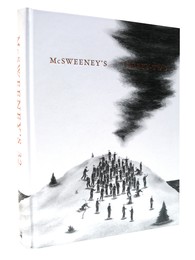 McSweeney’s is a quirky quarterly that breaks conventional publishing boundaries with each issue devoted to a unique theme, both in terms of editorial content and physical packaging. For McSweeney’s 32, its last issue of 2009, ten contributors were tasked with writing tales specifically set somewhere in the world that take place fifteen years hence in 2024. According to the editors:
McSweeney’s is a quirky quarterly that breaks conventional publishing boundaries with each issue devoted to a unique theme, both in terms of editorial content and physical packaging. For McSweeney’s 32, its last issue of 2009, ten contributors were tasked with writing tales specifically set somewhere in the world that take place fifteen years hence in 2024. According to the editors:
…we wanted to hear about where we’d be — to see what the world could look like when things had shifted just a bit , as it seems like they’re starting to, heading into the second decade of the third millennium…and a semitangible future at last seeming imminent.
For the most part, this is a future defined by natural disaster, frequently involving water. Serendipitously, I read this during a record snowfall in which I was homebound for four days before my driveway could be cleared out. While the state declared an emergency disaster, and unlike a lot of Virginians who lost power as well, it didn’t much matter to me that I couldn’t go anywhere since I was comfortable with reading material, heat, food and Internet access. Not Katrina, by any means, but “normal life” did shut down for a short time. In some of these stories, normal becomes not a return following a disaster, but is defined by the disaster.
There was a time when futurist stories were about how humanity overcame its limitations, both in terms of earthbound existence and its evolutionary defects (remember that what was supposed to be so “innovative” about the original Star Trek was that it depicted various races working together in harmony, forgetting that women of any race were stuck in miniskirts and mostly served as subserviant love interest for the captain). It would seem that from the perspective of the oughts of the 21st century, the future does not look particularly bright.
 Well, entering the year (both in terms of typing the title and having lived to see
Well, entering the year (both in terms of typing the title and having lived to see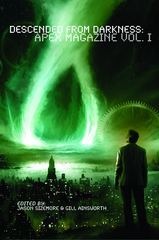 it) was a little weird to write. The first chapter of The Martian Chronicles is January 1999, which from the vantage point of the middle of the 20th century, when the German V-rockets had landed not on another planet, but London, that seemed about right for when humanity might be “reaching for the stars” as it was called. The book ends in April 2026 which, with luck, proper diet and exercise, and health care reform I might actually still be alive to see. And which more than likely humankind, assuming it hasn’t blown itself up, will remain earthbound.
it) was a little weird to write. The first chapter of The Martian Chronicles is January 1999, which from the vantage point of the middle of the 20th century, when the German V-rockets had landed not on another planet, but London, that seemed about right for when humanity might be “reaching for the stars” as it was called. The book ends in April 2026 which, with luck, proper diet and exercise, and health care reform I might actually still be alive to see. And which more than likely humankind, assuming it hasn’t blown itself up, will remain earthbound. Here in Central Virginia, we’re having one of those once in a decade or so storms in which you fill up your bathtubs with water and just hope the electricity stays on. So far it has (or otherwise I wouldn’t be able to post this).
Here in Central Virginia, we’re having one of those once in a decade or so storms in which you fill up your bathtubs with water and just hope the electricity stays on. So far it has (or otherwise I wouldn’t be able to post this). Talebones, a so-called semi-prozine published twice a year, is calling it quits with issue #39 , some 14 years from its debut in 1995. Details as to why editor/owner Patrick Swenson is ending publication are scant, other than this terse
Talebones, a so-called semi-prozine published twice a year, is calling it quits with issue #39 , some 14 years from its debut in 1995. Details as to why editor/owner Patrick Swenson is ending publication are scant, other than this terse 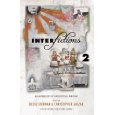 What’s interesting about a collection of “interfictions,” aka “interstitial fictions,” is that this isn’t just another descriptor (e.g., new wave fabulism, new weird, slipstream, paraspheres, fill-in-the-blank) made up by an editor or a marketing department or critic that subsequently becomes blogosphere fodder about how inaccurate and/or stupid it is. Rather, interfictions is the self-proclaimed terminology of an actual
What’s interesting about a collection of “interfictions,” aka “interstitial fictions,” is that this isn’t just another descriptor (e.g., new wave fabulism, new weird, slipstream, paraspheres, fill-in-the-blank) made up by an editor or a marketing department or critic that subsequently becomes blogosphere fodder about how inaccurate and/or stupid it is. Rather, interfictions is the self-proclaimed terminology of an actual 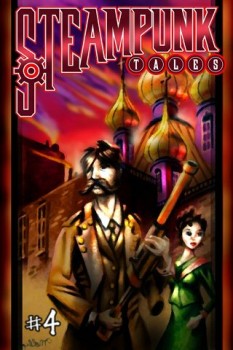 Steampunk Tales offers an interesting convergence of the new and old, a pulp magazine for the iPhone (don’t worry, non-Apple heads, there’s also a downloadable PDF version). Volume 4 features ten stories:
Steampunk Tales offers an interesting convergence of the new and old, a pulp magazine for the iPhone (don’t worry, non-Apple heads, there’s also a downloadable PDF version). Volume 4 features ten stories: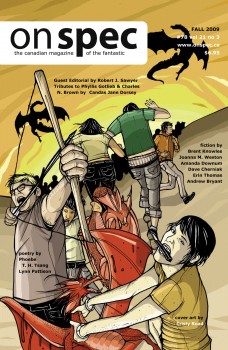 Canadian SF magazine
Canadian SF magazine  Though I had unrealistic high hopes for the remake of The Prisoner, if only because of the presence of Ian McKellan,
Though I had unrealistic high hopes for the remake of The Prisoner, if only because of the presence of Ian McKellan,  On a more positive note, I just finished Jonathan Lethem’s
On a more positive note, I just finished Jonathan Lethem’s  In today’s mail arrived the December 2009
In today’s mail arrived the December 2009